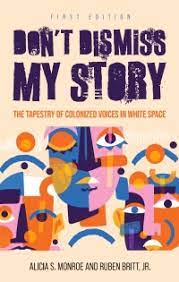By Charles A. Barnes II, JD, DEI Fellow and Ph.D. Candidate


I recently had the privilege of speaking with Rowan’s Dr. Alicia Monroe and Mr. Ruben Britt, Jr. about their book, Don’t Dismiss My Story: The Tapestry of Colonized Voices in White Spaces. As seasoned educators, Monroe and Britt leverage the power of personal narratives to ignite critical conversations about the enduring legacy of colonization with the landscape of whiteness in education.
Their book confronts the historical and contemporary marginalization of indigenous and minoritized voices. Monroe stresses the necessity of “commencing with the historical context of colonization,” acknowledging that addressing oppression is “a complex, long-term process.” Britt sheds light on colonial principles’ enduring influence in our education system, expressing concern over the limited progress made, particularly regarding “underrepresented voices in the curriculum.” Their shared intention is to address this pressing yet often “unspoken ‘elephant in the room” within education, says Britt.
 Don't Dismiss My Story employs a qualitative approach, utilizing “personal narratives, interviews, and case studies” to explore systemic oppression’s challenges and the resilience of those facing it. It addresses historical and contemporary aspects of colonization’s impact on the education system. Its organization involves themed chapters, each offering insights into different dimensions of this overarching topic. By drawing from diverse stories and experiences, it emphasizes marginalized voices’ importance in challenging and transforming oppressive systems.
Don't Dismiss My Story employs a qualitative approach, utilizing “personal narratives, interviews, and case studies” to explore systemic oppression’s challenges and the resilience of those facing it. It addresses historical and contemporary aspects of colonization’s impact on the education system. Its organization involves themed chapters, each offering insights into different dimensions of this overarching topic. By drawing from diverse stories and experiences, it emphasizes marginalized voices’ importance in challenging and transforming oppressive systems.
Each story within the book is told by Black and Brown faces that illuminate multiple facets of marginalization. As Monroe succinctly states, “The real story is our lived reality, our lived experience. The false narratives are not going to prevail forever.” Her reference to “false narratives'' indicates the dominant, historically perpetuated narratives that have often erased or denied oppressed groups’ realities. As Britt asserts, “These narratives have, over time, shaped the perspectives and policies that perpetuate systemic oppression.” Approaches like Critical Race Theory (CRT) have utilized “counterstories” to counter dominant narratives by sharing marginalized communities’ experiences and perspectives. Counterstorytelling is a powerful tool for advocating more inclusive, diverse, and equitable interpretations of history and society.
At its core, the book challenges readers to reflect and “take a journey of introspection,” says Britt. It targets diverse audiences interested in education, equity, diversity, and marginalized voices, seeking to raise awareness, stimulate critical thinking, and inspire action. For educators, it provides inclusive strategies. For researchers, valuable perspectives. For students, empowerment through shared experiences. For policymakers, a deeper understanding of marginalized challenges. For advocates, a resource and inspiration. For general readers, an opportunity to learn about social justice and marginalized narratives. Ultimately, it aims to address marginalization in colonized spaces, fostering a more equitable society.
Monroe and Britt want to stimulate action, not just words. As Monroe passionately declares, “You’ve got to do the work.” Through candid storytelling and reflection, their book represents a call to transform education and heal colonization’s wounds, demonstrating how marginalized voices catalyze change through the power of narrative.
For more information on how to obtain a copy of this book, visit the Cognella Academic Publishing website.